Canadian Prime Minister Justin Trudeau’s government yesterday committed 600 troops and C$450mn ($350mn) over three years to United Nations peacekeeping operations around the world.
Touted by the Liberal administration as a recommitment to multilateralism, the move also positions Canada to make a stronger bid for a rotating seat on the UN Security Council.
Ottawa’s “commitment to increase Canadian participation in UN peace operations and supporting its mediation efforts, preventing conflicts, and engaging in post-conflict reconstruction” will give Canada “a stronger voice on the world stage,” foreign affairs minister Stephane Dion told a news conference.
The announcement comes ahead of a major peacekeeping conference in London in two weeks.
In order to attend, countries must make a tangible peacekeeping pledge.
A decision, however, has not yet been made about where to deploy the military personnel, said defence minister Harjit Sajjan.
Trudeau is likely to identify a specific mission or missions when he goes to the UN General Assembly next month.
Whereas his Conservative predecessor Stephen Harper sought distance from the UN, Trudeau has signalled that Canada now intends to play an increased role beyond its borders through the global body.
According to government figures, 31 Canadian soldiers were deployed this year on UN peacekeeping missions in Haiti, the Jerusalem region, South Sudan, Cyprus, the Democratic Republic of Congo and South Korea, down from a reported peak of 3,000 in 1993.
Trudeau also announced in February, when he hosted UN secretary-general Ban Ki-moon in Ottawa, that Canada would seek a seat on the Security Council, hoping to erase the humiliation of its first failed bid in 2010 under the previous Tory administration.
In a statement yesterday, the government said the Canadian deployment would tackle “multifaceted conflicts, requiring political, security, development and humanitarian responses brought together under the broad umbrella of ‘peace operations’”.
Funding would go to protect displaced persons, refugees, women and children, as well as to support “early warning, conflict prevention, dialogue, mediation and peace-building, and the empowerment of women in decision-making for peace and security”.
The 600 personnel will include ground troops and commanders, with engineering and medical expertise and military and police training.
Military transport aircraft will also be deployed.
Trudeau has said French speakers in the Canadian military are in demand in hotspots in some former French or Belgian colonies, including Haiti and the Central African Republic.
Sajjan recently returned from a five-country scouting mission in Africa, providing a hint of possible countries in which Canada may deploy troops.
International Development Minister Marie-Claude Bibeau also visited Colombia earlier this year, opening the door to Canada playing a role in an upcoming ceasefire observer mission following a truce between the government and rebel forces.
The United Nations yesterday applauded Canada’s decision to commit 600 troops and funding to peacekeeping, saying it will have a big impact.
UN officials will quickly begin talks with Ottawa to nail down the specific details of the contribution, which could also include helicopters, desperately needed for the UN mission in Mali.
“This will have a big impact,” said UN spokesman Stephane Dujarric.
“We have no doubt the Canadian armed forces can help us bolster our capabilities across the globe.”
Military transport aircraft will also be deployed and training provided for UN troops and police, according to Canadian officials.
In the coming days, UN officials “will actively engage with the government of Canada to explore when and when the broad range of services and troops they have offered can be best deployed to best meet the needs of our missions”, said Dujarric.
This could include helicopters for the UN mission in Mali after Dutch forces said they were planning to withdraw seven helicopters from the west African operation.
“We would look towards those countries who have the capacity to replace those helicopters,” said Dujarric.
“We are going to have a discussion with the Canadians to see where and how their contributions can be best put to use.”
The announcement came ahead of a meeting in London on September 6 aimed at boosting UN peacekeeping, following US president Barack Obama’s pledging conference.
At that conference, more than 50 countries pledged more than 40,000 troops for deployment in UN missions worldwide.
The pledges represent a major boost to UN peacekeeping, which relies on voluntary contributions from UN member states to run its 16 missions worldwide.
The Canadian prime minister will tour the Great Wall, shoot hoops with retired basketball star Yao Ming and host a roundtable of women entrepreneurs when he travels to China next week to bolster trade and diplomatic ties, his office said yesterday.
There will be bilateral meetings with Chinese president Xi Jinping and senior government officials during the August 30 to September 6 trip, which includes stops in Beijing, Shanghai and Hong Kong.

Canadian prime minister Justin Trudeau.
